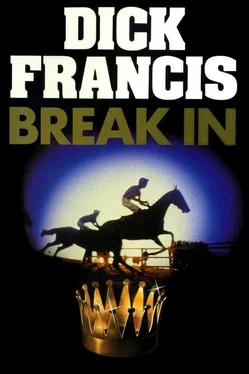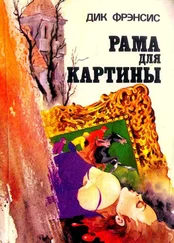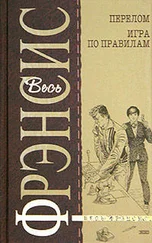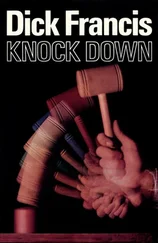Lord Vaughnley looked from his son to myself, and his reaction wasn’t forgiveness, apathy, irritation or even anger.
It was alarm. It was horror.
He recovered fast to some extent. Lady Vaughnley put her arms around Hugh and hugged him, and her husband looked on, stony-faced and displeased. Others of their guests came in good spirits back to the box, and Hugh was proved right to the extent that his father was not ready to fight with him in public.
Lord Vaughnley, in fact, addressed himself solely to me, fussing about cups of tea and making sure I talked no more to his son, seemingly unaware that his instant reaction and his current manner were telling me a good deal more than he probably meant.
‘There we are,’ he said heartily, getting a waitress to pass me a cup. ‘Milk? Sugar? No? Princess Casilia’s mare is all right, isn’t she? So sad when a horse breaks down in a race. Sandwich?’
I said the mare wouldn’t race again, and no thanks to the sandwich.
‘Hugh been bothering you with his troubles, has he?’ he said.
‘Not really.’
‘What did he say?’
I glanced at the grey eyes from where the blandness had flown and watchfulness taken over.
‘He said he had quarrelled with you and wanted to make it up.’
‘Hmph.’ An unforgiving noise from a compressed mouth. ‘As long as he didn’t bother you?’
‘No.’
‘Good. Good. Then you’ll be wanting to talk to Princess Casilia, eh? Let me take your cup. Good of you to come up. Yes. Off you go, then. Can’t keep her waiting.’
Short of rudeness I couldn’t have stayed, and rudeness at that point, I thought, would accomplish no good that I could think of. I went obediently along to the princess’s well-populated box and drank more tea and averted my stomach from another sandwich, and tried not to look too much at Danielle.
‘You’re abstracted,’ the princess said. ‘You are not here.’
‘I was thinking of Lord Vaughnley... I just came from his box.’
‘Such a nice man.’
‘Mm.’
‘And for Danielle, this evening, what are your plans?’
I shut out the thoughts of what I would like. If I could read the princess’s mind, she could also on occasion read mine.
‘I expect we’ll talk, and eat, and I’ll bring her home.’
She patted my arm. She set me to talk to her guests, most of whom I knew, and I worked my way round to Danielle scattering politeness like confetti.
‘Hi,’ she said. ‘Am I going back with Aunt Casilia, or what?’
‘Coming with me from here, if you will.’
‘OK.’
We went out on to the balcony with everyone else to watch the sixth race, and afterwards said goodbye correctly to the princess and left.
‘Where are we going?’ Danielle asked.
‘For a walk, for a drink, for dinner. First of all we’re walking to Ascot town, where I left the car, so as not to be carved up again in the car park.’
‘You’re too much,’ she said.
I collected my suitcase from the changing room and we walked down through the cheaper enclosures to the furthest gate, and from there again safely to the rented Mercedes.
‘I guess I never gave a thought to it happening again,’ she said.
‘And next time there would be no princess to the rescue.’
‘Do you seriously think they’d be lying in wait?’
‘I still have what they wanted.’ And I’d twisted their tail fiercely, besides. ‘I just go where they don’t know I’m going, and hope.’
‘Yes, but,’ she said faintly, ‘for how long?’
‘Um,’ I said, ‘I suppose Joe doesn’t work on Sundays?’
‘No. Not till Monday night, like me. Not week-ends. What’s that got to do with how long?’
‘Tuesday or Wednesday,’ I said.
‘You’re not making much sense.’
‘It’s because I don’t know for sure.’ We got into the car and I started the engine. ‘I feel like a juggler. Half a dozen clubs in the air and all likely to fall in a heap.’
‘With you underneath?’
‘Not,’ I said, ‘if I can help it.’
I drove not very fast to Henley, and stopped near a telephone box to try to reach Rose Quince, who was out. She had an answering machine which invited me to give a number for her to call back. I would try later, I said.
Henley-on-Thames was bright with lights and late Saturday afternoon shopping. Danielle and I left the car in a parking place and walked slowly along in the bustle.
‘Where are we going?’ she asked.
‘To buy you a present.’
‘What present?’
‘Anything you’d like.’
She stopped walking. ‘Are you crazy?’
‘No.’ We were outside a shop selling sports goods. ‘Tennis racket?’
‘I don’t play tennis.’
I waved at the next shop along. ‘Piano?’
‘I can’t play a piano.’
‘Over there,’ I pointed at a flower shop. ‘Orchids?’
‘In their place, but not to pin on me.’
‘And over there, an antique chair?’
She laughed, her eyes crinkling. ‘Tell me, too, what you like, and what you don’t.’
‘All right.’
We walked along the shopfronts, looking and telling. She liked blues and pinks but not yellow, she liked things with flowers and birds on, not geometric patterns, she liked baskets and nylon-tipped pens and aquamarines and seedless grapes and books about Leonardo da Vinci. She would choose for me, she said, something simple. If I were giving her a present, I would have to have one as well.
‘OK,’ I said. ‘Twenty minutes. Meet me back at the car. Here’s the key, in case you get there first.’
‘And not expensive,’ she said, ‘or I’m not playing.’
‘All right.’
‘When I returned with my parcel she was sitting in the car already, and smiling.
‘You’ve been half an hour,’ she said. ‘You’re disqualified.’
‘Too bad.’
I climbed into the car beside her and we sat looking at each other’s packages, mine to her in brown paper, hers to me flatter, in a carrier bag.
‘Guess,’ she said.
I tried to, and nothing came. I said with regret, ‘I don’t know.’
She eyed the brown-wrapped parcel in my hands. ‘Three books? Three pounds of chocolates? A jack-in-a-box?’
‘All wrong.’
We exchanged the presents and began to unwrap them. ‘More fun than Christmas,’ she said. ‘Oh. How odd. I’d forgotten it was your name.’ She paused very briefly for thought and said it the other way round. ‘Christmas is more fun.’
It sounded all right in American. I opened the paper carrier she’d given me and found that our walk along the street had taught her a good deal about me, too. I drew out a soft brown leather zipped-around case which looked as if it would hold a pad of writing paper and a few envelopes: and it had KIT stamped in gold on the top.
‘Go on, open it,’ she said. ‘I couldn’t resist it. And you like neat small things, the way I do.’
I unzipped the case, opened it flat, and smiled with pure pleasure. It contained on one side a tool-kit and on the other pens, a pocket calculator and a notepad; all in slots, all of top quality, solidly made.
‘You do like it,’ she said with satisfaction. ‘I thought you would. It had your name on it, literally.’
She finished taking off the brown paper and showed me that I had pleased her also, and as much. I’d given her a baby antique chest of drawers which smelled faintly of polish, had little brass handles, and ran smoothly as silk. Neat, small, well-crafted, useful, good-looking, efficient: like the kit.
She looked long at the implications of the presents, and then at my face.
‘That,’ she said slowly, ‘really is amazing, that we should both get it right.’
Читать дальше




